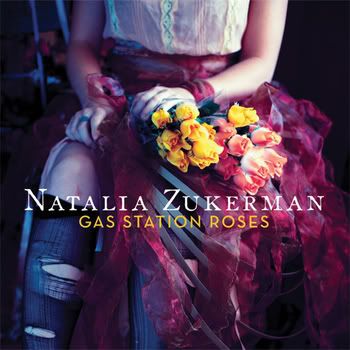
[purchase, scroll down]
Almost every artist I have reviewed goes with a tight song structure. Verses and choruses proceed in a predictable pattern, and the bridge, if there is one, comes roughly in the middle. The verses rhyme and scan in a particular way, and the choruses might have a different scheme, but each chorus works the same way as every other. I’m not knocking writing a song this way. It’s not easy to do it and have it sound true. But it’s possibly even harder to break these rules, and still have songs that work. That’s what Natalia Zukerman does on Gas Station Roses, and she makes it work beautifully. The songs here are messy, but so are the relationships they portray. Choruses arrive like unfinished thoughts, to be fleshed out in later iterations. Rhymes happen naturally, if at all, and the number of syllables in a particular line may change from verse to verse. All of this comes on top of the tight grooves laid down by Zukerman and her band. In fact, there is a tension between the tightness of the playing and the looseness of the vocal lines, and that is why the whole thing works so well.
The last song on the album is Little Bird, and it features just voice, acoustic guitar, and an understated bass part. But the rest of the album’s songs have drums, bass, and some combination of electric, acoustic, and lap steel guitars. Brooklyn adds a tenor sax, Indiana has some amazing interplay between tenor sax and harmonica, and Howard Hughes features fiddle and banjo. The music is a fine stew of rock, blues, and even intimations of funk in places. And then there is Zukerman’s voice. She sings in a smoky alto. Her voice is often breathy, but she can break into a full voice that tends to reach for higher notes and heightened emotions. She can portray hope and disappointment in the same song. And her singing adds a detail to some of the songs that is not in the lyric: she has a warmth and even a sense of humor that says she can pick herself up and go on. Love doesn’t always work out, but Zukerman’s characters are never ready to give up on it.
In the song Brooklyn, an unread book can cause an avalanche. At the start of the song, this is a symbol of a cluttered life. But by the end, when the image returns, I had the sense that reading the book meant allowing oneself to fall in love, and the avalanche was now emotional rather than physical. This is a fine example of how Natalia Zukerman uses a metaphor, and she does it exceptionally well. A word or a phrase will repeat in the course of a song, and its meaning will change with the context. Zukerman uses this device to tell her stories. Gas Station Roses is one those songs where you wonder what the chorus has to do with anything. The song seems to be a simple plea for love. But the last verse ties it all together, and the song turns out to be an attempted apology. Indiana is a mood piece. On top of great atmospheric music, the lyric uses a series of images to describe a bleak emotional landscape, but Zukerman still offers hope. Sorry Side of Town has a narrator who must learn to let go of self pity and accept love. Instead of the sudden breakthrough you might expect, there is a gentle evolution, beautifully rendered. And Come Undone might have been a good title for this album. Each of the song’s four verses ends with the words “Come undone”, and each time the meaning of these words shifts, from a burst of mutual attraction, to a tumultuous point in a relationship, to finally an acceptance and a sort of emotional détente.
On the basis of this album, then, Natalia Zukerman is a fine writer who speaks by indirection, but eloquently. She is a singer who can say things that her words do not. She has put together a fine band who create exactly the right atmosphere for each song here, and also provide a nice variety of sounds throughout the album. Gas Station Roses is a rare treat.
Natalia Zukerman: Gas Station Roses
Natalia Zukerman: Come Undone






0 comments:
Post a Comment